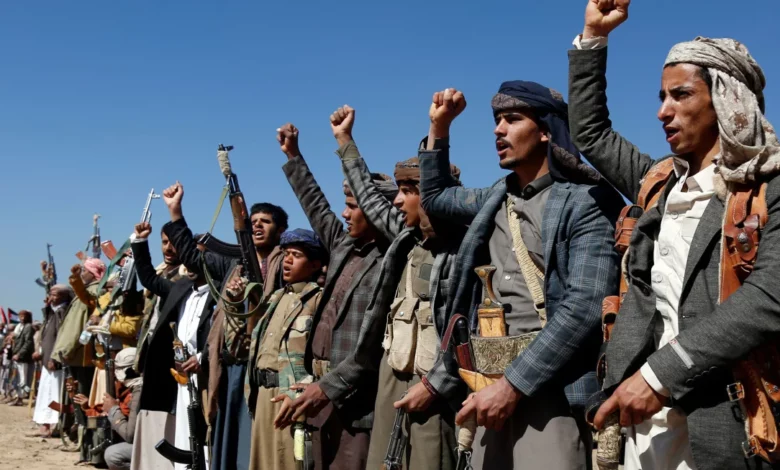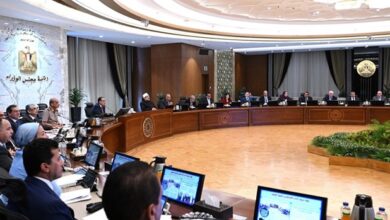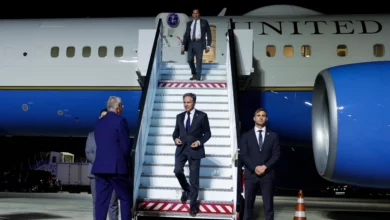
Administration officials said the SDGT designation is aimed at deterring the Huthis from their ongoing aggression in the Red Sea. It is latest in a series of US actions targeting the Iranian-backed group and comes as the specter of a wider regional war in the Middle East looms large.
“These attacks are clear example of terrorism and a violation of international law and a major threat to lives, global commerce, and they jeopardize the delivery of humanitarian assistance,” a US senior administration official said in a call with reporters Tuesday.
The administration removed the Huthis’ SDGT designation and de-listed it as a foreign terrorist organization (FTO) in February 2021, after it was designated by the Trump administration in its final weeks.
At the time, Secretary of State Antony Blinken said the decision to remove the group’s designations was driven by concerns that it could imperil the ability to deliver crucial assistance to the people of Yemen. He said it was “a recognition of the dire humanitarian situation in Yemen.”
However, pressure has grown on the administration to reimpose the designations amid the attacks in the Red Sea, which the Huthis claim is retaliation for the Israeli military offensive in Gaza. The attacks have had consequences for the global economy as they have effectively closed one of the world’s main trade routes to most container ships.
The administration did not re-list the Huthis as a foreign terrorist organization.
Both terrorist designations trigger economic sanctions, but only an FTO designation imposes as travel ban on members of the group and authorizes sanctions on those who provide “material support” to it, according to the State Department.
“We believe that the SDGT designation is the appropriate tool at the moment to pressure the Huthis,” said the senior administration official. The official said that the SDGT designation allows “better flexibility” to target the Huthis while minimizing the risk to humanitarian aid.
The reimposed SDGT designation will take effect 30 days from Wednesday, the official said, “to allow us to ensure a robust humanitarian carve outs are in place so our action targets the Huthis and not the people of Yemen.”
A second senior administration official said the administration will conduct outreach during that 30-day period to organizations involved with humanitarian aid to Yemen. 21.6 million people were in need of such assistance in 2023, according to the World Food Programme.
The officials said the designation is not meant to impact the fragile truce in Yemen between the Huthis and the Saudi-led coalition.
National Security Council Coordinator for Strategic Communications John Kirby told CNN’s MJ Lee Wednesday that the decision was meant to be “a pliable form of economic pressure” that the administration can withdraw if the Huthis cease attacks on commercial vessels in the Red Sea.
“The thing about sanctions designations is that they are a pliable form of economic pressure. You can scale them up, you can scale them down, you can lay them on, you can take them off in a fairly simple way,” Kirby said. “If they if they choose to stop these attacks, then we certainly have the option at our disposal to remove this designation that we just issued.”
Kirby added that President Joe Biden does not regret delisting the Huthis as a Foreign Terrorist Organization after taking office in 2021, saying the president did so to address “a dire, dire humanitarian situation on the ground” in Yemen.
The administration officials also argued that the terrorist designation is part of the broader effort to get the Huthis to stop their attacks in the Red Sea.
“If we saw a cessation of Houthi attacks on ships, we are willing to look at this designation is very much targeted on that specific terrorist behavior. We also would be willing to look at it not coming to effect if the Huthis stopped tomorrow,” the first official said. “We are absolutely targeting the cessation of these attacks, rather than a broader suite of behavior with these sanctions.”
Last Thursday, the United States and the United Kingdom launched strikes against Houthi targets in Houthi-controlled areas of Yemen. Biden said he ordered the strikes “in direct response to unprecedented Houthi attacks against international maritime vessels in the Red Sea,” adding that he would “not hesitate to direct further measures to protect our people and the free flow of international commerce as necessary.”
The US has carried out additional strikes against the Huthis in the days since.
Administration officials have repeatedly said that they see these actions as defensive rather than escalatory.
“When the Huthis started these attacks, we pressed very hard for them to stop, but without escalation of any kind,” Secretary of State Antony Blinken told CNBC Tuesday. “This has been an attack on international commerce, international shipping, not an attack on Israel, not an attack on the United States. That’s why more than 40 countries came together to condemn what the Huthis were doing. It’s why other countries came together to say, if this continues, there are going to be consequences, not for purposes of escalating, but for purposes of getting them to stop.”
“We’ve not wanted to see escalation anywhere since October 7,” he said. “We’re working every single day to prevent it, including in the Red Sea.”
This story has been updated with additional information.




